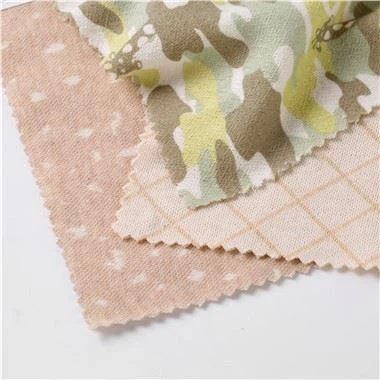Environmentally Friendly Fabrics Are The Future Development Trend Of The Textile Industry
Mar 29, 2023
The use of environmentally friendly fabrics in the fashion industry is a general trend and an important part of the entire industrial system. The fashion industry is actually one of the major polluting industries in the world, every step in the fashion production process is accompanied by potential environmental impacts. The fibers and ingredients are used in fashion have caused different forms of environmental pollution.
For example, the most common polyester fiber in our clothes, the production process not only consumes a lot of energy, but also requires a lot of oil and releases a lot of waste. Volatile monomers, solvents and other by-products of polyester production are released with the factory's effluents, affecting water, air and soil.
The increasingly difficult environmental problems are not only seen and felt by ordinary people, but also attracted the attention of more and more fashion manufacturers, and the importance of eco-fashions has gradually become prominent. The use of environmentally friendly fabrics and recycled fabrics not only reflects the brand's responsibility to improve the ecological environment, but also an important trend in the development of the global textile industry.
Realize energy saving and emission reduction through technological innovation
The use of high-quality equipment and technology has greatly improved production capacity and product quality, while reducing costs and promoting energy conservation and environmental protection. Dyeing through cylindrical packages can reduces the dyeing bath ratio and saves dyeing materials; at the same time, through the intelligent operation of the manipulator, automatic yarn loading, dehydration, and yarn unloading are realized; the dyeing vat uses pipelines to automatically transport chemicals can avoid environmental pollution. These industry-leading technologies can improve production efficiency, save water and electricity, reduce sewage discharge, and achieve the goal of protecting the environment with intelligent production with a high degree of automation and good early warning performance.
Fashion should be sustainable fashion
Fashion should be sustainable fashion. It should not only bring people a beautiful appearance and confidence, but also should be healthy, beneficial to the development of the earth, and sustainable.
Natural fabrics, organic fabrics, plant fabrics, man-made biodegradable fiber fabrics, recycled fabrics, functional/innovative fabrics, green dyeing and finishing fabrics, these seven series of products are environmentally friendly fashion fabrics. For example, the pineapple leaf fiber fabric is extracted fiber from discarded pineapple leaves, and after further processing, it can be blended with natural fibers or synthetic fibers. Its production does not require land, water, pesticides, fertilizers, and also can’t generate waste materials. Its woven fabric is easy to print and dye, sweat-absorbent and breathable, crisp and wrinkle-free, and can replace leather products.
Major breakthrough in cellulose yarn technology
Eastman (China) Investment Management Co., Ltd. is a global specialty materials company whose products are widely used in various fields of people's daily life. At the same time, they are also a sustainable fiber manufacturer. The latest bio-based Naia™ cellulose yarn launched in 2022 are demonstrating the brand's sustainable commitment and a major breakthrough in cellulosic yarn technology.
Turning Plastic Bottles Into Recycled Fabrics
In 2007, Unifi found its true mission with the development of the recycled fiber REPREVE®, it making sustainability to a whole new level. REPREVE® is the world's leading recycled fiber brand. In order to protect the air, land, sea and other natural resources that humans depend on, they have transformed more than 21 billion recycled plastic bottles into recycled fibers for clothing, footwear, and household items and other consumer products. Using recycled polyester instead of untreated polyester can reduces carbon emissions, gives a second life to plastic bottles that would be waste, and keeps them out of oceans and landfills.
Products come from natural, environmental friendly, biodegradable
Sateri is one of the global leaders in the cellulose fiber industry,it can provide a full product line of zero-carbon solutions. Its EcoCosy®, Sateri Lyocell and FINEX™ have all obtained carbon-neutral PAS2060 certification. and obtained the carbon neutral label of SGS, an internationally recognized third-party testing organization, to meet diversified product needs.
Biodegradable Rare Fibers
Asahi Kasei Co., Ltd. is a Japanese chemical company that has developed in many fields, and Bemberg is the brand of the regenerated cellulose fiber produced by Asahi Kasei, which has a history of more than 90 years. The raw material of Bemberg is cotton linters, it is a by-product produced during the processing of cottonseed oil. This material can be biodegraded under the action of nature, and returned to the soil to make compost without causing harm to the soil. At the same time, the company strictly manages the chemical substances used in the production process, and continuously improves and improves the production process through their unique copper and ammonia recycling closed-loop system to better promote the sustainable development of society.
The fiber surface of Bemberg is very smooth and is not prone to friction. You can feel the continuous comfort from the moment of skin contact, which can make the movement of body parts more free and unhindered. The beautiful coloring performance, luster and unique feel also make it exude a full sense of presence, moreover, Bemberg fibers contain a lot of moisture, which can keep the inner environment of the clothes comfortable no matter what the season.
Build a zero-waste life cycle and promote sustainable development
Bossa Denim is one of the largest integrated textile company in Turkey. Since 1951, Bossa has been actively involved in the protection and preservation of the environment, human health and social conditions. They define "sustainability" as "continuous development that helps meet the needs of the present without compromising the ability of future generations to meet their own needs". To this end, Bossa has implemented a series of projects and initiatives such as on-site water pretreatment and full biological treatment, energy saving and recycling, separation and on-site utilization or off-site recycling of all solid waste, use of environmentally friendly raw materials, dyes throughout the production cycle and processed substances...







